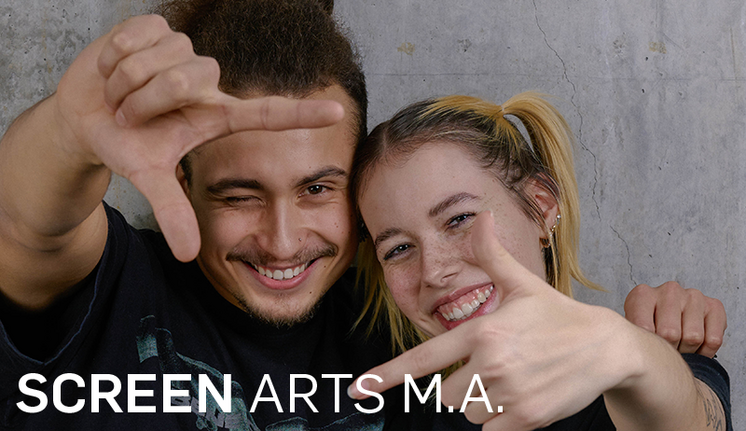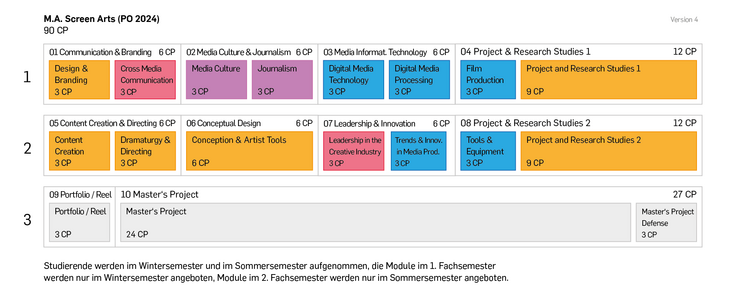What is it about?
SCREEN ARTS is an artistic degree program designed for graduates with a bachelor’s degree in film, communication or media. The master’s program is perfect for creative minds who want to expand their knowledge and skills for a career in the film and media industry while studying in an international environment.
Inspired film and media professionals can deepen their skills in content creation, storytelling, dramaturgy and conception and expand their know-how by studying moving image media in the fields of media culture, media technology, journalism and production management.
The languages of instruction in the SCREEN ARTS degree program are German and English. Students can study the degree program in German with some classes in English or chose the English track which is taught entirely in English.
The degree program maintains an extensive international network and offers a wide range of opportunities to study at a partner university abroad. Students can complete a double degree at renowned universities in Norway or Thailand.
The Screen Arts degree program replaces the Creative Media Conception degree program, that is, students will be admitted to the newly accredited Screen Arts degree program as of winter semester 2024/25.
What do I need?
Admission to the master’s degree program in SCREEN ARTS requires a first qualifying degree (bachelor’s, Diplom or comparable degree) with a grade equivalent to at least 2.5 in German school grades. The content of the bachelor’s degree must prepare students for the master’s degree program. Applicants must prove previous knowledge by having completed the B.A. in Media: Conception & Production at RheinMain University of Applied Sciences or a comparable degree program that included at least 30 credit points in the field of media design.
Applicants must also submit a letter of motivation for admission and a demo reel with samples of work from their own moving image productions and/or other creative projects as proof of suitability for the program. The demo reel should have a maximum length of five minutes and must be submitted in a resolution of 1920px x 1080px as an MP4 file with a list of sources for the work samples and an assurance of authorship.
The following templates are to be used for the application for admission to the SCREEN ARTS degree program:
- Letter of motivation (28 KB docx)
- Documentation of the work samples in the demo reel (list of sources) (28 KB docx)
- Documentation of the credit points from studies in media design (recognition of courses) (28 KB docx)
PLEASE NOTE: All documents must be submitted as PDF files using the RheinMain University of Applied Sciences application portal!
As the degree program is offered entirely or partly in English, sufficient knowledge of English (level B2 according to the Common European Framework of Reference for Languages) is required. Separate proof for the standard track is not required. English-language requirements for the English track are met by a standardized language test or if the first qualifying degree was acquired with English as the language of instruction in an English-speaking country (Ireland, UK, USA, Canada, Australia, or New Zealand).
Detailed information on the admission requirements can be found in the admission regulations (“Zulassungssatzung” PDF 81 KB).
What can I do with it?
Thanks to their wide-ranging expertise and extensive practical experience, SCREEN ARTS graduates develop creative concepts for the production of documentary, journalistic and fictional content. They are able to quickly get familiar with various topics, prepare content in a media- and target group-appropriate way and stage it dramaturgically.
In addition, graduates have in-depth knowledge of the technical processes and organizational aspects of moving image production. Their skills in the use of professional hardware and software enable them to realize media productions efficiently and in high quality.
Graduates of the degree program can be found in various positions in different industries that deal with moving images. These include the following companies and organizations:
- Film and television productions,
- streaming services,
- broadcasting organizations,
- communication and event agencies,
- marketing departments and
- cultural and educational institutions.
Profile
|
Study location |
Wiesbaden, Unter den Eichen Campus |
|
Period of study |
3 semesters |
|
Main language of instruction |
Mainly in German, partly in English (Standard track) English (English track) |
|
Accreditation agency |
Internal accreditation |
|
Start of program |
Winter and summer semester |
|
Admission |
Application deadline: 15 January and 15 July of each year |
|
Contact |
The i-Punkt on the Kurt-Schumacher-Ring campus can help with all questions regarding the degree program and application. The contact person for the degree program itself is Professor Stephan Schwarz. |

SCREEN ARTS students should have an equal interest in creative conception and design, the development and adaption of content and the organisational and technical implementation of media.
In the modules Content Creation & Directing and Conceptual Design, students specialize in the conception, design, production and post-production of moving image media in the form of film, digital content and animations. The Leadership & Innovation module enables students to deal with trends and innovations in the media industry and the management of media productions.
The Communication & Branding and Media Culture & Journalism modules offer insights into the working methods and organization of agencies, editorial offices and film productions. Students learn how to conceptualize, design and produce media content and formats for different target groups. They acquire the necessary technical expertise in the Media Information Technology module.
The project-centered learning in the Research Project 1 + 2 modules complement the first two semesters. By working together on projects with practical issues relating to virtual production, green shooting and diversity, students have the opportunity to experiment with the topics of digitalization and sustainability, take on different roles in the team and gain practical experience in the conception, organization and implementation of innovative moving image productions.
The degree program concludes with the Master’s Project, which consists of practical project work and a written assignment.
Technical equipment
The degree program has high-quality cameras (including Arri Alexa) and the necessary equipment for the professional realization of photo and film productions. A large part of the equipment can be borrowed by students for the production of projects as part of their studies, as well as for the realization of their own ideas when the equipment is not being used in teaching.
Studios for film and moving image productions
Our two studios for moving image productions are central facilities of the degree program. Studio A is primarily used for exercises and smaller video productions (e.g. recording interviews or news programs). Both studios have a control room for the production and streaming of programs under “live” conditions. The large Studio B is equipped with a truss system and numerous lights, which can be used to realize very different lighting situations. The large area of the studio enables the construction of rooms and other backdrops and the recording of programs with several cameras. A 300° green screen and the ability to record movements (motion tracking) create further possibilities for the realization of creative ideas and innovative projects.
Sound studio and audio production
The degree program is also very well equipped in the field of audio production, both for the recording of audio, music and sound in Dolby Surround, the production of podcasts and radio programs, the dubbing of films and the production of music.
Post-production
The degree program provides students with the technical infrastructure to view, edit, cut and distribute projects and manage data in a decentralized team as part of their courses and projects. Numerous editing suites and powerful computers enable the rendering of large amounts of data and color grading, as well as the compositing of films and animations.
With us, you will find the perfect environment to create your projects and improve your design and technical skills. We look forward to supporting you!
The SCREEN ARTS degree program is very well connected internationally and offers a wide range of opportunities to study at a partner university. You can obtain a double degree and finish your studies with two degrees – the Master of Arts from RheinMain University of Applied Sciences and an additional master’s degree from a partner university. Thanks to the agreements with our partner universities, the coursework and examinations completed abroad are mutually recognized. Double degree students must earn a total of 60 credit points (ECTS) at a partner university over the course of two semesters abroad. The overall period of study will be extended by one semester only.
Partner universities for a double master’s degree
You can complete your double degree at the following internationally renowned universities in Norway or Thailand:
Høgskulen i Volda / Volda University College (Volda, Norway) – additional master's degree in Media Practices
International College of Nida (Bangkok, Thailand) – additional master's degree in Management
Walailak University (Nakhon Si Thammarat, Thailand) – additional master's degree in Management
All students of the program have the opportunity to study abroad for a semester at one of our many partner universities, regardless of whether they choose to pursue a double degree.
Study plan of the double degree program
The study plan of the double degree program varies depending on the partner university, but generally starts with a semester at HSRM. This is followed by two semesters abroad before the students return to HSRM for the final semester. After completing the master's degree at RheinMain University of Applied Sciences, the degree from the partner university is also granted.
At International College of NIDA and Walailak University, HSRM students can start the double degree program in both the winter and the summer semester. At Volda University College, it is only possible to start in the summer semester (i.e. 1st summer semester at HSRM, 2nd and 3rd semester at VUC, 4th semester at HSRM). Find more details on the study plan and the double degree programmes on StudIP or write an email with questions to globaldesign(at)hs-rm.de.
Funding opportunities
Depending on the partner university, there are various options to fund a period of study abroad or complete a double degree.
Some funding options are:
- Auslands-BAföG (BAföG abroad)
- Scholarship from the DAAD (German Academic Exchange Service)
- PROMOS funding (via HSRM, information from the International Office)
- Erasmus+ funding
The SCREEN ARTS / English track is an offer for students who have not graduated with a bachelor’s degree in Germany and whose native language is either English or who have sufficient English language skills.
The standard track, on the other hand, is primarily aimed at students who have obtained their bachelor’s degree in Germany. Students enrolled in the standard track may increase the proportion of courses taught in English on a voluntary basis.
Students in the SCREEN ARTS / English track are admitted to both the winter semester (mid-October to mid-February) and the summer semester (mid-April to the end of July). Semester 1 modules are only offered in the winter semester, semester 2 modules only in the summer semester. This means that the order of study depends on the start of the program and you will attend courses with students from the second semester in the first semester and vice versa.
First-year students on the SCREEN ARTS / English track must arrive in Germany at least two weeks before the start of their studies to attend the Welcome Week for international students. Even if you can communicate in English in Germany, we strongly recommend that you attend an intensive German course for international students at RheinMain University of Applied Sciences.
PLEASE NOTE: Courses in English are only offered if the international students are enrolled in the English track of the degree program. English language courses are not language courses and are usually taught by non-native speakers.
We are pleased if you are curious about the SCREEN ARTS degree program and if you are interested in further information. Alexander Kallenberg from the Student Advisory Service at RheinMain University of Applied Sciences will be happy to answer any general questions you may have about choosing the right degree program or the organizational aspects of the application process. If you have general questions about the organization or the application process and the recognition of credits, you can contact secretary's office of the degre program. If you are interested in academic advice or would like to know what your chances are of being admitted to the degree program, please contact the head of the degree program, Professor Stephan Schwarz.
We offer an online meeting via Zoom in May and June for the winter semester and in December and January for the summer semester. The next dates are:
Friday, May 24 2024, 12:00 – 13:00 (MEZ)
Wednesday, June 5 2024, 15:00 – 16:00 (MEZ)
Tuesday, July 2 2024, 14:00 – 15:00 (MEZ)
The dates for the second half of the year are expected to be published in September 2024.
You are welcome to attend without registration. You need a computer with a webcam and a microphone to attend. Simply click on the link or the date to join the Zoom meeting. You can participate using your browser – please test this before the meeting to ensure that your audio and video are transmitted (you may need to change the settings). If you have missed the meeting, please contact the secretary's office or Professor Stephan Schwarz directly.
Student advising at RheinMain University of Applied Sciences
Alexander Kallenberg
Email: Alexander.Kallenberg(at)hs-rm.de
Telephone: +4961194951597
Head of degree program SCREEN ARTS (M.A.)
Prof. Stephan Schwarz
Email: stephan.schwarz(at)hs-rm.de
Telephone: +49 611 9495 2149
SCREEN ARTS Secretary’s office
Celia Kubiczeck
Email: sekretariat-cmc(at)hs-rm.de
Telephone: +49 611 9495 2258
Meike Jäger
Email: sekretariat-cmc(at)hs-rm.de
Telephone: +49 611 9495 2258
Office hours of the secretary’s office during the teaching period
| Monday to Thursday | 09:00 – 14:00 |
| Friday | 09:00 – 12:00 |
Office hours of the secretary's office during semester break
| Tuesday to Thursday | 09:00 – 12:00 |
Visitor's address
Unter den Eichen 5
65195 Wiesbaden
Gebäude C Süd, 2. OG, Raum C268
What can I expect from the degree program?
The courses in the degree program have different formats, for example, lectures and seminars. However, the majority of the program is dedicated to applying real-life equipment and facilities and completing many practical and application-oriented exercises in small groups. Students and lecturers are in close contact with each other. Overall, the atmosphere is informal and relaxed.
Can I work while I study?
Even though this is a full-time degree program, you can earn some extra money while you study. Given the high number of practice-driven courses, which are often organized as block courses, in some phases you will have to be more present at the university and in others less.
Where can I find examples of work by students of the program?
There is an extensive archive of examples of students' work from different semesters on Vimeo and YouTube.
What technical equipment do I need for the degree programme?
The degree program provides the equipment required for projects and exercises. You can also borrow equipment from the degree program, but only if the equipment is not required for an exercise or production. You should have your own computer or laptop (PC or Mac), preferably a powerful one.
How many students are accepted? Is it possible to start in the summer and winter semester?
You can start the program both in the winter and the summer semester, although the courses are only offered once a year. As the courses in the first two semesters do not build on each other in terms of content, you will attend courses with students from the second semester in the first semester. We accept around 10 students per semester, so the number of places is very limited. Nevertheless, you have a very good chance of being accepted if you have a genuine interest in the field of moving image and can show us with your application that you have already gained some experience in film production or animation.
What should the demo reel show?
The demo reel usually consists of a compilation of films or animations in which you were significantly involved, be it in the conception and/or production and/or post-production. In the documentation you must submit with the demo reel, you can describe your role in the project (e.g. idea, script, dramaturgy, production/set, camera/DOP, lighting, production management), as well as background information (e.g. production period, client, content partner). You can also send us a link to an online portfolio – if you have one – to show us more of your work.
What should the letter of motivation look like? Should I make the letter particularly appealing?
There is a template for the cover letter with a few questions you should answer. You can simply fill in the template or write your own cover letter, but you do not have to come up with a particularly creative design for the cover letter.
When applying for admission to the degree program, does the equivalence list also have to be completed by students who have completed the Media: Conception & Production program?
Yes, the list must be completed by all applicants.
I have been admitted to the degree program, how can I prepare?
Shortly after your admission to the degree program, you will receive your access data to the Rheinmain University of Applied Sciences systems and your new email. You should set up your accounts as soon as possible and check them regularly – you will receive emails with important information about the start of your studies to your RheinMain University of Applied Sciences email account.


